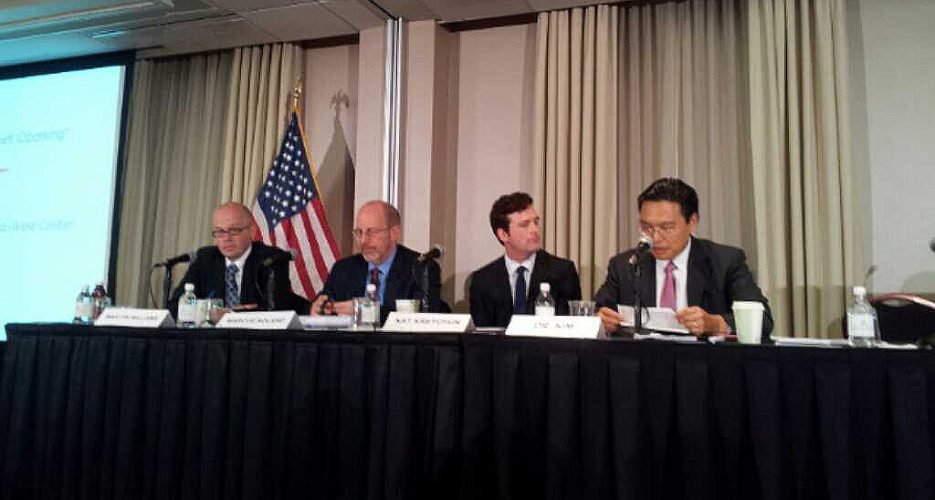On May 10, InterMedia Associate Director Nathaniel Kretchun delivered a presentation on the changing media environment of North Korea, suggesting that the presence of unsanctioned foreign media has been expanding in recent years and is now providing many citizens with news, entertainment, and alternative opinion. Taken with the increased prevalence of cheap and easy-to-hide communications technologies, foreign media are now undermining Pyongyang’s monopoly on what people see, hear, know – and potentially think. Entitled “A Quiet Opening: North Koreans in a Changing Media Environment”, Kretchun was joined at the discussion by a panel of North Korea specialists and practitioners, including Ambassador Robert R. King, Marcus Noland, Martyn Williams, and Korea Economic Institute moderator, Dr. Abraham Kim.
To start off, Kretchun described some of the caveats to consider when assessing his team's research on the role of foreign media in North Korea. As is often the case with reports on North Korea, Kretchun and colleague Jane Kim compiled the backbone of their research by interviewing defectors who had recently left North Korea. And while this provides one of the best available means of compiling data on opinions and attitudes inside the DPRK, Kretchun reminded the audience that it is by no means a perfect technique.
On May 10, InterMedia Associate Director Nathaniel Kretchun delivered a presentation on the changing media environment of North Korea, suggesting that the presence of unsanctioned foreign media has been expanding in recent years and is now providing many citizens with news, entertainment, and alternative opinion. Taken with the increased prevalence of cheap and easy-to-hide communications technologies, foreign media are now undermining Pyongyang’s monopoly on what people see, hear, know – and potentially think. Entitled “A Quiet Opening: North Koreans in a Changing Media Environment”, Kretchun was joined at the discussion by a panel of North Korea specialists and practitioners, including Ambassador Robert R. King, Marcus Noland, Martyn Williams, and Korea Economic Institute moderator, Dr. Abraham Kim.
To start off, Kretchun described some of the caveats to consider when assessing his team's research on the role of foreign media in North Korea. As is often the case with reports on North Korea, Kretchun and colleague Jane Kim compiled the backbone of their research by interviewing defectors who had recently left North Korea. And while this provides one of the best available means of compiling data on opinions and attitudes inside the DPRK, Kretchun reminded the audience that it is by no means a perfect technique.
Become a member for less
than $5.75 per week.
Unlimited access to all of NK News: reporting, investigations, analysis
The NK News Daily Update, an email newsletter to keep you in the loop
Searchable archive of all content, photo galleries, special columns
Contact NK News reporters with tips or requests for reporting
Get unlimited access to all NK News content, including original reporting, investigations, and analyses by our team of DPRK experts.
Subscribe now
All major cards accepted. No commitments – you can cancel any time.









